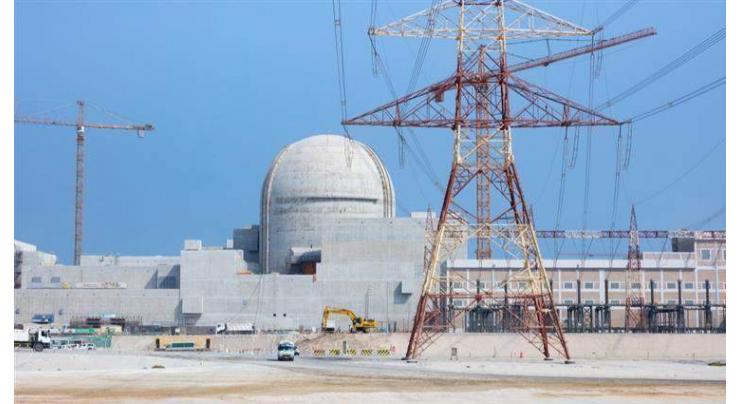
- Home
- Middle East
- UAE
- UAE Peaceful Nuclear Energy Programme plays key role in supporting growth: Mohammed Al Hammadi
UAE Peaceful Nuclear Energy Programme Plays Key Role In Supporting Growth: Mohammed Al Hammadi
Sumaira FH Published January 14, 2019 | 10:15 PM

Mohammed Ibrahim Al Hammadi, CEO of the Emirates Nuclear Energy Corporation, ENEC, stated that the UAE Peaceful Nuclear Energy Programme plays a key role in supporting economic and social growth, as the Barakah Nuclear Power Plant will produce environmentally-friendly electricity without carbon emissions
ABU DHABI, (UrduPoint / Pakistan Point News / WAM - 14th Jan, 2019) Mohammed Ibrahim Al Hammadi, CEO of the Emirates Nuclear Energy Corporation, ENEC, stated that the UAE Peaceful Nuclear Energy Programme plays a key role in supporting economic and social growth, as the Barakah Nuclear Power Plant will produce environmentally-friendly electricity without carbon emissions.
In statements to the Emirates news Agency, WAM, Al Hammadi explained that new generations of nuclear power reactors that are under development, which are also known as small reactors, are a promising development in the sector, and can complement the pressurised water reactors, PWR, of the advanced third generation APR1400 adopted by the Barakah Peaceful Nuclear Power Plant Project, which produces considerable baseload electricity.
On the sidelines of the ENEC’s participation in the World Future Energy Summit, one of the main activities of Abu Dhabi Sustainability Week, Al Hammadi stressed that peaceful nuclear energy, along with renewable energy, can help combat climate change and limit carbon emissions.
He also noted that the programme is helping to achieve the UAE Energy Strategy 2050, which aims to limit the UAE’s carbon print by 70 percent over the next 30 years.
Al Hammadi also highlighted the importance of international partnerships in the peaceful nuclear energy sector while noting the joint coalition agreement signed between the ENEC and the Korea Electric Power Corporation, KEPCO, and its success in achieving key accomplishments in terms of construction and operations.
The plant’s construction is steadily progressing, and the completion of its four stations has reached a rate of over 91 percent at the end of November 2018.
Recent Stories

At least 10 people killed in Brazil fire: officials

Shahzaib Rind calls on Deputy Speaker Balochistan

Ahsan chairs 13th CPEC-JCC preparatory meeting, reviews arrangements for high-le ..

DC Tharparkar inaugurates anti-polio campaign

HDA Mehran workers demand salaries

Taxila police nab motorcycle lifter gang

Inter-university weightlifting championship kicks off at SAU

Walk held in a series of enrollment campaigns

Team from Gaza mediator Egypt arrives in Israel for truce talks

Kids murders: IHC orders psychiatric examination of mother

Health minister credits PML-N for advancements in organ transplantation

Court grants interim bail to Azam Swati in cyber crime case
More Stories From Middle East
-

UAE announces ‘Zero Bureaucracy Program’ to reduce bureaucracy
3 months ago -

COP28 President-Designate welcomes Transitional Committee agreement to operationalise Loss and Damag ..
6 months ago -

Global Media Congress 2023 to feature Co-Production Majlis as a new networking platform
6 months ago -

Young female athletes shine at Abu Dhabi World Youth Jiu-Jitsu Championship
6 months ago -

King of Jordan receives Abdullah bin Zayed and ministers participating in Arab coordination meeting
6 months ago -

Abdullah bin Zayed participates in coordination meeting of Arab foreign ministers, joint meeting wit ..
6 months ago
-

3rd annual conference of Emirates Society of Clinical Microbiology kicks off in Dubai
6 months ago -

SIBF 2023 hosts Nobel laureate to discuss emergence of ‘Afrofuturism’ in global discourse
6 months ago -

ALC announces winners of Kanz Al Jeel Award 2023
6 months ago -

SIBF turns spotlight on remarkable contributions of women
6 months ago -

Global assets in spot bitcoin ETFs hit $4.16 billion
6 months ago -

Rescuers struggle to find Nepal quake survivors as deaths reach 157
6 months ago











